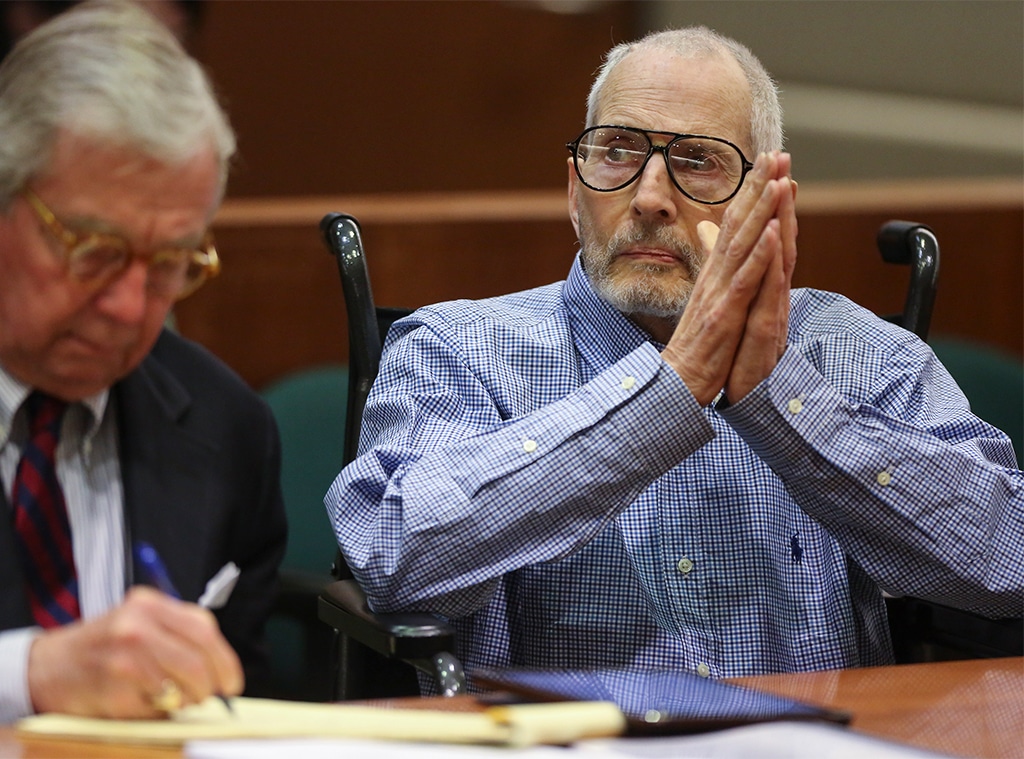Robert Durst, millionaire who was focus of HBO documentary 'The Jinx,' found guilty of first-degree murder
-- A Los Angeles jury found Robert Durst, the notorious subject of the HBO series "The Jinx," guilty of first-degree murder for the killing of his best friend, Susan Berman, more than 20 years ago.
Durst
has been charged with the first-degree murder of Berman in 2000 at her
Beverly Hills home, hours before she was set to talk to investigators
about the mysterious disappearance of his first wife, Kathleen McCormack
Durst, who was last seen in 1982.
McCormack Durst was declared legally dead in 2017. Her body has not been found and no one has been charged in the case.
Jurors
also agreed the crime met 'special circumstances' in California law,
which would allow Durst to be sentenced to life without parole, for the
murder of a witness to a crime, lying in wait and using a firearm in the
murder.
California has a moratorium on the death penalty. Durst's sentencing hearing is scheduled for October 18.
"The
jury's decision demonstrates how our legal system can work to hold
accountable people regardless of their wealth and status in life,"
District Attorney George Gascón said. "I want to commend our prosecution
team and investigators for their diligent work to ultimately bring
justice for those who have been waiting more than 20 years."
Durst,
78, took the stand in his defense during the sensational trial in Los
Angeles County Superior Court. He denied killing Berman and said he
found her on the floor of her bedroom with a fatal gunshot to the back
of the head.
Defense Attorney Dick DeGuerin said he was very disappointed by the verdict.
"We fought hard, but we came in second," he said.
Durst
was not in court to hear the verdict due to recent exposure to someone
with Covid-19. He remains in quarantine after one of his drivers tested
positive for the coronavirus, DeGuerin said.
He said he was unable to reach Durst to relay the verdict to him.
"We
are extremely gratified and appreciative of the verdict that the jury
reached in this case," lead prosecutor John Lewin said afterward. He
called Durst a "narcissistic psychopath" and added, "He got a lot more
of a life than he was entitled to."
The
judge ordered the jurors' personal identifying information would be
sealed for privacy and safety. It is up to the jurors whether they
choose to discuss any deliberations or verdict.
Durst's
testimony spanned three weeks, with much of the cross-examination
devolving into contentious sparring with prosecutor Lewin.
Prosecutors
allege Durst shot Berman in the head. They said Durst confided to
Berman he had killed Kathleen, and she helped him cover his tracks.
On
the stand, Durst denied murdering his first wife and, later, Berman.
But under cross-examination, Durst testified he would perjure himself if
he had killed them. Lewin prompted Durst to admit he perjured himself
five times during the trial, which resumed in May after a 14-month delay
due to the pandemic.
There
was little physical evidence in Berman's unsolved death. There were no
people who witnessed the shooting and no murder weapon.
In
closing arguments, prosecutor Habib Balian pointed to one of the
state's strongest witnesses, a longtime friend of both Durst and Berman,
Nick Chavin, who testified the defendant had told him, "It was her or
me," referring to Berman. "I had no choice."
"Those nine words sum up the entire case," Balian told jurors.
Another
key piece of evidence was the so-called "cadaver" note, a cryptic
letter sent to police with Berman's address and the word "cadaver" in
caps that led detectives to her body.
In the 2015 HBO documentary "The Jinx,"
Durst said the letter could have been sent only by Berman's killer.
Defense lawyers had previously denied Durst wrote the note, and they
unsuccessfully tried to exclude from trial handwriting evidence about
it.
Filmmakers
confronted Durst with another letter he once mailed Berman, with nearly
identical handwriting to the "cadaver" note. In both, Beverly Hills was
misspelled as "BEVERLEY."
In
a court filing, lawyers for the real estate mogul late last year
reversed course and acknowledged Durst penned the anonymous note. "This
does not change the fact that Bob Durst did not kill Susan Berman,"
DeGuerin said at the time.
Durst's second murder trial is one more chapter in an unusual life that reached mass audiences through "The Jinx" miniseries.
He
was arrested in New Orleans the night before the airing of the final
episode of the miniseries. In its final moments, Durst went into the
bathroom, apparently not realizing his mic was still on, and made a
series of comments that became infamous.
"There it is. You're caught," he said in a series of seemingly unrelated sentences. "He was right. I was wrong."
"What
the hell did I do? Killed them all, of course," he said in what was
widely interpreted by viewers as a confession. But transcripts of the
audio recording in court revealed that the quotes were spliced and
edited to be in a different order and context, The New York Times has
reported. Durst has said he was "high on meth" during the taping of the
documentary.
Durst's
health has deteriorated since the documentary. He is thin and hunched
over and speaks in a whispery voice. Durst has bladder cancer and has
undergone multiple surgeries, including the insertion of a shunt in his
head to relieve pressure on his brain.

2 comments:
Perhaps Durst insisted. He is after all the client and therefore the ultimate boss.
It worked at his 1st trial. My former partner is elated with the verdict.
Post a Comment